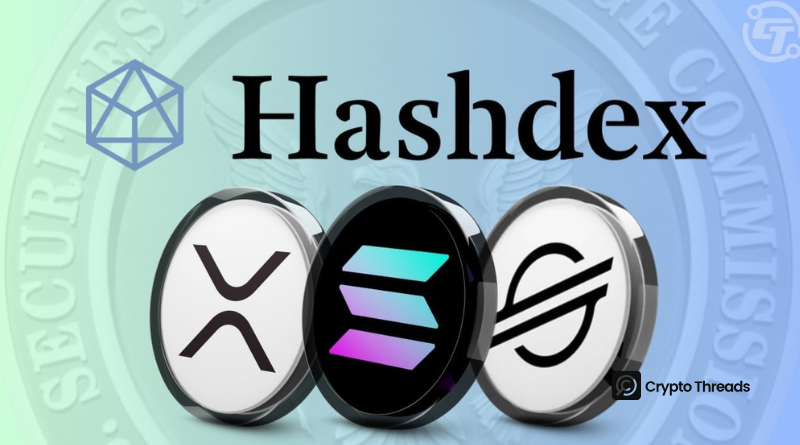Hashdex Expands Crypto Index US ETF After SEC’s Generic Listing Rule Change
Hashdex has broadened its Crypto Index US ETF (NCIQ) to include XRP, Solana (SOL), and Stellar (XLM), becoming the second multi-asset crypto ETF approved for U.S. trading. The move follows the SEC’s new generic listing standards, which streamline approvals for ETFs holding eligible cryptocurrencies.
- SEC’s September policy enables faster ETF approvals for cryptos meeting commodity or futures criteria and Intermarket Surveillance Group oversight.
- Analysts expect a surge of multi-asset ETF filings as these standards lower regulatory hurdles.
Grayscale’s Digital Large Cap Fund was the first multi-asset crypto ETF approved under the new rules. - SEC Chair Paul Atkins, backed by the Trump administration, is pushing pro-crypto reforms like an “innovation exemption” and clearer digital-asset market structure.
Hashdex has expanded its Crypto Index US ETF (ticker: NCIQ) to include XRP, Solana (SOL), and Stellar (XLM) alongside its existing holdings of Bitcoin and Ether. Announced Thursday, the change comes under the U.S. Securities and Exchange Commission’s recently approved generic listing standards, which simplify the approval process for exchange-traded funds holding certain cryptocurrencies.
The SEC’s new framework, passed in September 2025, allows ETFs to list crypto assets more quickly if the tokens are classified as commodities or have futures contracts on regulated exchanges and are subject to surveillance by the Intermarket Surveillance Group. This rule removes a major regulatory bottleneck, creating a clearer path for multi-asset crypto ETFs and expanding investor access to diversified digital-asset products.

Hashdex’s updated ETF becomes the second U.S.-approved multi-asset crypto ETF, following the SEC’s mid-September greenlight of Grayscale’s Digital Large Cap Fund, which holds BTC, ETH, XRP, SOL, and Cardano (ADA). Market analysts see these developments as a watershed moment for crypto ETFs, blurring the line between traditional finance and digital assets by allowing mainstream investors to gain exposure to a basket of cryptocurrencies through familiar stock-market infrastructure.
The policy shift reflects a broader pro-innovation stance from SEC Chair Paul Atkins, who has proposed an “innovation exemption” to create a regulatory sandbox for crypto projects. Backed by the Trump administration, the SEC in 2025 has moved away from “regulation by enforcement,” aiming instead for comprehensive digital-asset market structure rules and clearer commodity classification for most cryptocurrencies. These reforms sharply contrast with the stricter posture under former Chair Gary Gensler.
With Hashdex’s expansion and Grayscale’s precedent, industry insiders expect a surge of new filings as asset managers rush to capitalize on the streamlined process. For investors, the arrival of multi-asset ETFs like NCIQ offers diversified crypto exposure under the oversight of regulated U.S. exchanges, signaling that crypto is moving deeper into the mainstream financial system.
Final Thought
Hashdex’s broadened ETF illustrates how the SEC’s new rules are accelerating Wall Street’s integration with digital assets, opening the door for more diversified crypto investment products in U.S. markets.



